
Getting diagnosed with COPD and watching your body change can be a disheartening thing to go through. This, along with the symptoms of COPD, make depression a reality for a large number of COPD patients.
It's not too difficult to see why; COPD can lead to weight loss, fatigue, sleep disorders, poor nutrition, and a variety of other uncomfortable symptoms. These ailments can be distressing on their own, leading to health anxiety, a negative outlook, and a feeling of loss of control over one's life.
According to some studies, up to forty percent of COPD patients suffer from depression. What's worse, many cases go untreated, which makes patients more likely to suffer a quicker physical decline and death.
But, while COPD can be difficult to cope with, there are plenty of options for support and treatment that can help you take back control over your life. Even though depression can make obstacles seem too difficult to face, the truth is that you can find the power within yourself to overcome them.
It is important to remember that it's more than possible to live a happy and fulfilling life despite the hardships that come along with COPD. If you can shake yourself free of anxiety and depression, you'll find that you have the ability cope in healthy ways and confidently meet any challenges that come your way.
It's hard to see the light when you are in the midst of depression and everything seems hopeless and bleak. That's why it's so important to recognize the signs of depression and seek treatment, and in this article we're going to show you how.
In the next sections, we'll show you how to identify depression and explain how it affects people with COPD. Then, we'll show you how to utilize available mental health resources and how to use a variety of practical techniques to help yourself out of depression.
What is Depression?
The term “depression” is often used loosely in casual conversation, but in reality, it is a serious medical illness. It is much more than just feeling a little down for a few days; it's a deep state of sadness and helplessness that affects many aspects of sufferers' lives.
Depression is often marked by hopelessness, lack of motivation, and lack of interest in activities that you used to enjoy. Depression often interferes with your ability to function and participate in activities at work, home, and with friends.
People who are depressed are also more at risk for a variety of other health problems, including obesity, substance abuse, and premature death. In general, people who are depressed have difficulty maintaining healthy habits and lead a significantly reduced quality of life.
Depression should always be taken very seriously and should never be ignored. If you or someone you know is showing the warning signs of depression, you should encourage them to seek help as soon as possible.
Symptoms of Depression
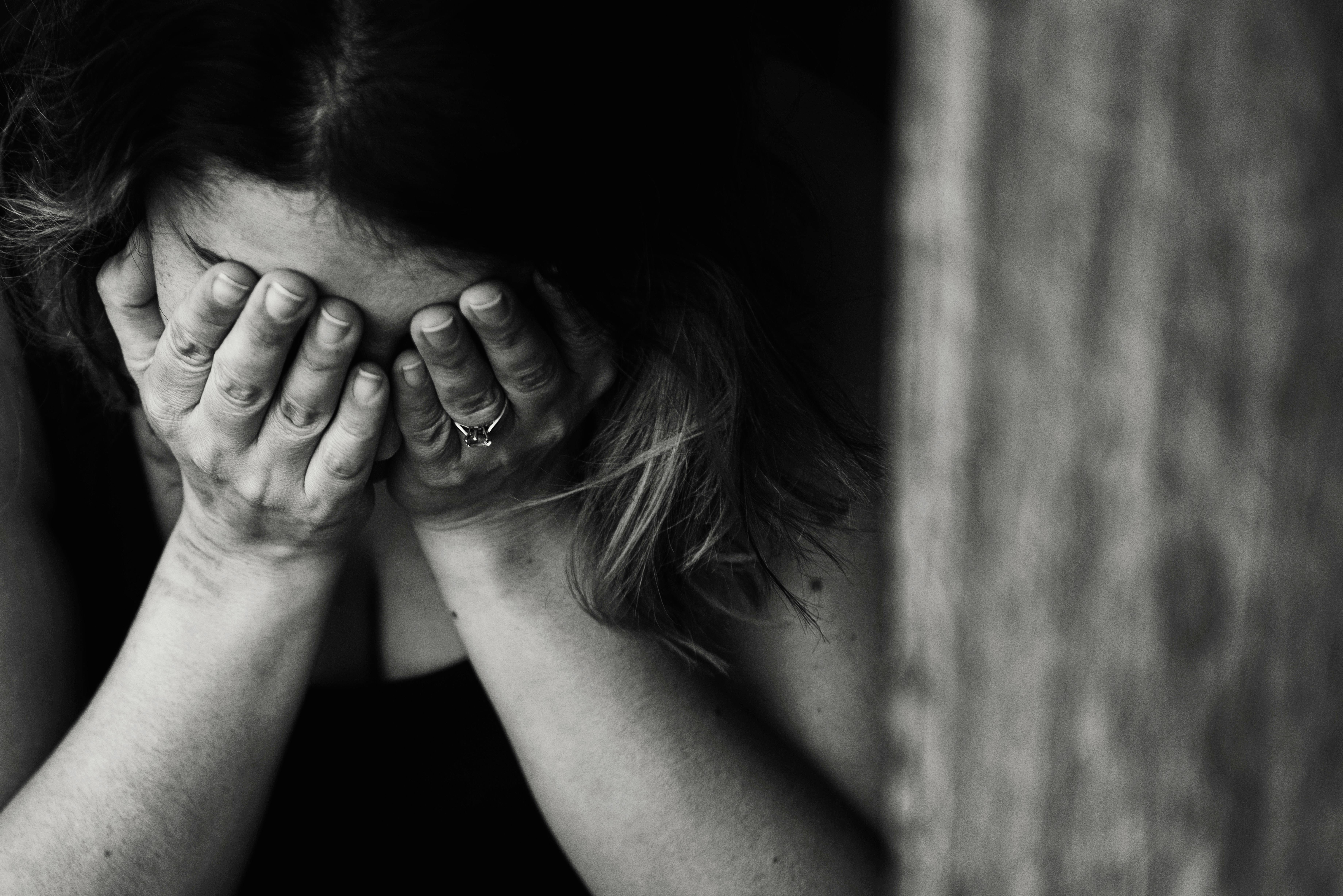
The main characteristics that separate clinical depression from normal sadness or negative moods is its severity and its duration. Everyone has a bad day or bad week every once and awhile, but people who suffer from depression often experience weeks or months of despair along with a variety of noticeable physical symptoms.
Here are some of the most common symptoms of depression:
- Sadness
- Emptiness
- Hopelessness
- Anxiety
- Helplessness
- Feelings of worthlessness
- Feelings of guilt
- Difficulty concentrating
- Difficulty sleeping
- Irritability
- Loss of appetite or increase in appetite
- Fatigue
- Lack of interest in hobbies and activities you used to enjoy
- Thoughts of death or suicide
How Depression Affects People with COPD

If left untreated, depression in people with COPD can significantly increase their risk for physical decline. It can increase patients' risk of exacerbations, loss of physical mobility, malnutrition, and even death.
There are many reasons for these risks, most of which have to do with changes in behavior and motivation that happen to COPD patients who are depressed. For example, depression can affect both your appetite and your sleep quality, leading to malnutrition and sleep deprivation. This, in turn, weakens your body, makes COPD symptoms worse, and depresses your immune system, making you more prone to exacerbations and hospitalizations.
Studies also show that people with COPD who are depressed are more likely to be hospitalized, less likely to adhere to COPD treatments, and have a much higher risk of death. They are also more likely to smoke and suffer from an overall decreased quality of life.
One of the most damaging effects of depression is how it can take away your motivation to do things that make you healthy and happy. Many people who are depressed stop exercising, eating, and socializing, which are important to living a healthy life with COPD.
There is hardly anything more essential for keeping yourself healthy with COPD than following your treatment plan, eating a healthy diet, and, especially, getting plenty of exercise. However, depression can take away your motivation to do all of these things, causing you to skip meals, workouts, and medication doses. This is a large part of the reason why many depressed COPD patients suffer a more rapid physical decline.
Another reason is the fact that being depressed can make it much more tempting to reach for unhealthy coping mechanisms like cigarettes and other drugs. Since smoking is one of the most damaging things you can do to your body when you have COPD, depression can be even more damaging to patients who are former smokers or who are currently trying to quit.
For all of these reasons, it's vitally important for COPD patients who suffer from depression to seek support and treatment as early as possible. It's certainly not something you should ever take lightly or ignore, as it could have huge and irreversible effects on your health.
Everyday Techniques for Reducing Depression for People with COPD

Everyday activities like diet and exercise can have a huge impact on how you feel. Building healthy habits in these areas is an important first step to breaking free from depression and getting yourself back on track to living a healthy, fulfilling life.
Exercise More

When you are feeling depressed, exercising and being active might sound like the last thing in the world that you want to do. However, getting out of bed every day and doing some physical activity can actually improve your depression, not to mention that it's absolutely necessary to prevent early death from COPD.
It can be difficult and disheartening to exercise when you're experiencing COPD symptoms like breathlessness and wheezing, which on its own can contribute to depression and exercise avoidance. However, skipping exercise will only make that same problem worse, making your body weaker and your lungs decline quicker.
On the other hand, forcing yourself to get out, move your body, and increase your fitness can do wonders for both your body and mind. It not only stimulates your brain and promotes a more positive mood, but it can also increase your physical strength and mobility, allowing you to breathe better, do more, and have more energy.
Here are some of the benefits of exercise for people with COPD:
- More efficient use of oxygen
- Stronger breathing muscles and using less energy to breathe
- Reduced shortness of breath
- Reduced anxiety and depression
- Improved self-esteem and self-image
- Increased physical endurance
- Increased energy levels and reduced fatigue
- Improved sleep quality and reduced insomnia
- Increased cardiovascular health and fitness
- Improved muscle strength

It's not hard to see how getting regular exercise can help with depression caused by COPD. As you see your physical strength and condition improve, you are bound to feel more confident and more optimistic about your future.
Committing to exercising even when you feel down will also allow you to stave off some of the most devastating effects of depression for people with COPD—loss of physical strength and quicker lung function decline. It can also put you in a much better place both physically and mentally to cope with and manage your disease.
That's why it's so important to exercise according to your COPD treatment plan, even when it's hard and you don't feel like it. As soon as you start to neglect your exercise plan, you can quickly fall into a negative downward spiral, where it becomes more and more difficult to exercise.
If you find exercise difficult or don't know where to start, talk to your doctor about joining a pulmonary rehabilitation program. There are also many resources online, such as the Cleveland Clinic, that offer advice and ideas for specific exercises for people with COPD.

Here are some general tips and resources to help you exercise with COPD:
- Start small and work your way up. Start by walking short distances or doing low-impact strength exercises, and increase the distance you walk and the number of repetitions you do by just a little bit every week. The improvements you make will motivate you to keep going and help you work up to more activity over time.
- If you have limited strength or physical mobility, try starting out with some chair exercises. These allow you to work out different parts of your body while sitting in a chair, which helps with balance and reduces the amount of strength you have to expend while still toning your muscles. Check out this comprehensive guide for a huge list of chair exercises with accompanying illustrations and instructions for how to perform them.
- Stretching exercises are easy to do and can improve your strength, mobility, and range of motion. You should always stretch before you workout, but you can also try stretching in the mornings and evenings to get some extra activity and keep yourself limber throughout the day. Check out this guide from Lung Foundation Australia that includes instructions for how to do a variety of different stretches.
- Use breathing exercises, such as pursed-lips breathing and diaphragmic breathing to help with breathlessness and wheezing when you work out. You should also keep your bronchodilator, supplemental oxygen, and any emergency medications with you in case you need them. Check out this guide from the Cleveland Clinic on how to manage your breathing while you exercise.
- Try joining a fitness class or trying an exercise like yoga or Tai Chi. Having instruction (at a gym or from an exercise tape) can help you get started more easily and keep you motivated to continue. Yoga and Tai Chi are especially good exercises for people with COPD because they incorporate breathing control and meditation in their routines.
Eat Well

When you are depressed, you might not feel like eating as much as you should. It can also make you feel sluggish and unmotivated, making you more likely to reach for convenient, unhealthy options, like fast food, instead of making nutritious meals at home.
But when you have COPD, proper nutrition is vital for keeping your body and lungs healthy. Lungs affected by COPD use up more energy when you breathe, meaning that many patients actually need extra calories to keep their lungs working efficiently.
Eating well is also important for improving depression, as the foods you eat can have a huge impact on both your body and your mind. If you eat unhealthy foods or let yourself become malnourished, you will feel even more tired, fatigued, and depressed.
A variety of nutritional deficiencies and imbalances can contribute to depression, including deficiencies in fats, amino acids, Vitamin D, and blood sugar imbalances. However, proper nutrition can help restore balance to your body and mind, giving your brain the vitamins and nutrients it needs to keep you happy and healthy.

Unfortunately, the symptoms of COPD often make it difficult to maintain a healthy weight and get enough nutrition. However, having a healthy BMI is important for managing the disease; obese COPD patients face a wide variety of health risks, while underweight patients are also more likely to experience more rapid physical decline and other health complications.
Some COPD patients find it difficult to get enough to eat because of COPD symptoms like breathlessness, which often are worse on a full stomach. If you are also depressed, you may experience a reduced appetite, reduced motivation, and reduced enjoyment from the taste of food, which makes it even more difficult to get enough calories and nutrients every day.
If you have COPD, you should think of every meal as an opportunity to strengthen your body and support the health and function of your lungs. Even though it can be difficult and time consuming, it's important to eat whole, home-cooked foods as much as possible so you have maximum control over what nutrients you put in your body.

Even though it might be difficult and require some adjustments to your schedule, you can find ways to eat healthy with minimal effort and discomfort. Here are a variety of tips and techniques for eating well to improve your depression and your COPD:
- Increasing your intake of certain foods has been shown to help fight depression. These include foods containing Vitamin D, omega-3 fatty acids, vitamin D, vitamin C, magnesium, selenium, and B vitamins.
- Avoid sugary drinks, caffeine, and fried foods, which can contribute to depression. Instead, increase your intake of water, healthy fats, complex carbohydrates, and whole fruits and vegetables. Here is a guide from Healthline to help you choose healthy, nutrient-rich foods for your kitchen.
- To avoid feeling uncomfortable and breathless when you eat, have several smaller meals throughout the day instead of large ones. This will help you eat enough calories without ever feeling too full.
- Prepare meals and freeze them ahead of time to eat on days when you feel especially depressed or fatigued. That way, even when you don't have the energy or motivation to cook, you can eat a nutritious, home-cooked meal with hardly any effort at all.
Get Out, Socialize, and Have Fun

Being depressed tends to cause people to isolate themselves and give up on the hobbies and activities that used to make them happy. This is partially due to a lack of energy and motivation, and partially due to a feeling of helplessness and a perceived inability to enjoy things that used to be fun.
However, even when things seem bleak, it's important not to neglect the people, hobbies, and productive activities that used to make you happy. Even if it doesn't feel satisfying right away, being social and active can improve your depression and will likely feel more satisfying with time.
Depression has an uncanny ability to make you avoid the very things that you need the most in order to break free from depression. Just remember that, even though things may seem hopeless right now, you will be much worse off if you give up and drop out of life's activities.
When you feel like staying indoors and avoiding the world, try calling up a friend or family member instead. Often, simply talking to someone else can help to pull you out of the fog and give you a more positive perspective on life.
It's okay to take days off and focus on self-care, but it's important not to let yourself stay in bed all the time and avoid the people who care about you. If you make an effort to get out of the house and spend time with family and friends, you will find it much easier to cope with depression and COPD.

And remember, it's okay to talk to your friends and family about your depression and let them know that you need support. Most people who care about you will understand and be willing to support you when you really need them.
Having a support group of family and friends and activities will give you something to get out of bed for and live for everyday. So don't let yourself become isolated from the people and things that matter in life; once you break out of your bubble, you might just start to notice all the many things that make life worth living.
Here are some tips for getting out, socializing, and having fun when you are depressed:
- Start small; if leaving the house seems like too much, try to get a little out of your comfort zone at home. Getting out of bed is the first step, and after that try to find some cozy activities around the house you can do. Even if you feel like hiding away and doing nothing, try to take another small step like making some coffee, taking a short walk, or just spending some time by a window or on your back porch.
- You don't have to over-commit in order to maintain your social relationships. If going to a celebration with lots of people sounds too overwhelming, try starting with something smaller, like going out for coffee with a single, close friend instead.
- If being out and about around other people seems like too much to stomach, try going out somewhere where you only have to have minimal human interaction. For example, you could go out and see a movie or take a walk on a low-traffic trail where you won't have to see or talk to anyone.
- Use the phone when you can't muster up the energy to socialize in person. Even if you don't feel like calling up a friend, give it a try anyway. Even just a quick chat with someone you love can lift your mood in unexpected ways.
- Put away your judgments and insecurities about yourself and cut yourself some slack. It's easy to feel guilty or self-conscious about being depressed, but there's no need to feel badly about a medical condition over which you have no real control. Try to let it go, tell yourself it's okay to feel how you feel, and allow yourself to go out into the world anyway.
- Don't push yourself too hard. If you go too far out of your comfort zone or take on too much, you might get burnt out and experience a backslide. Try to make every outing a positive experience, and learn to recognize when it's time to push yourself and when it's time to take it easy. Don't be afraid to take mental health days when you need them so you can recharge at home.
Mental Health Therapies for People with COPD

Now that we've given you some practical, everyday techniques for reducing depression, we're going to introduce you to a variety of mental health therapies and resources that can help. Even though making changes to your habits and lifestyle is a vital part of treating depression, it's just as important to seek therapy and get professional help.
In the following sections, we'll discuss several therapy options that are available for people struggling with depression, including group therapy, individual therapy, and animal-assisted therapy. We'll also show you how to practice a proven depression-fighting technique, called mindfulness meditation, that you can try by yourself at home.
Individual Therapy

If you suffer from depression, it's important that you have at least one private consultation with a mental health professional. That's usually the only way to get a proper diagnosis, and it's one of the best ways to ensure that you get the treatment and medication that you need.
A one-on-one consultation with a therapist gives you the opportunity to talk about your struggles, worries, and hopes in a safe and compassionate environment. It gives your therapist the opportunity to tailor advice and treatment options to your particular needs and give you referrals to other mental health resources that can help.

You should also consider seeing a licensed psychiatrist, especially if you think you suffer from chronic, clinical depression. A psychiatrist can determine whether or not medication can help you treat your depression, and can prescribe you antidepressants if needed.
To find a therapist, you can look for one yourself online, using services like GoodTherapy.org, or you can talk to your primary care doctor to get a recommendation and referral. You might also want to call your insurance provider for help finding mental health professionals that are covered in-network under your plan.
Group Therapy and Support
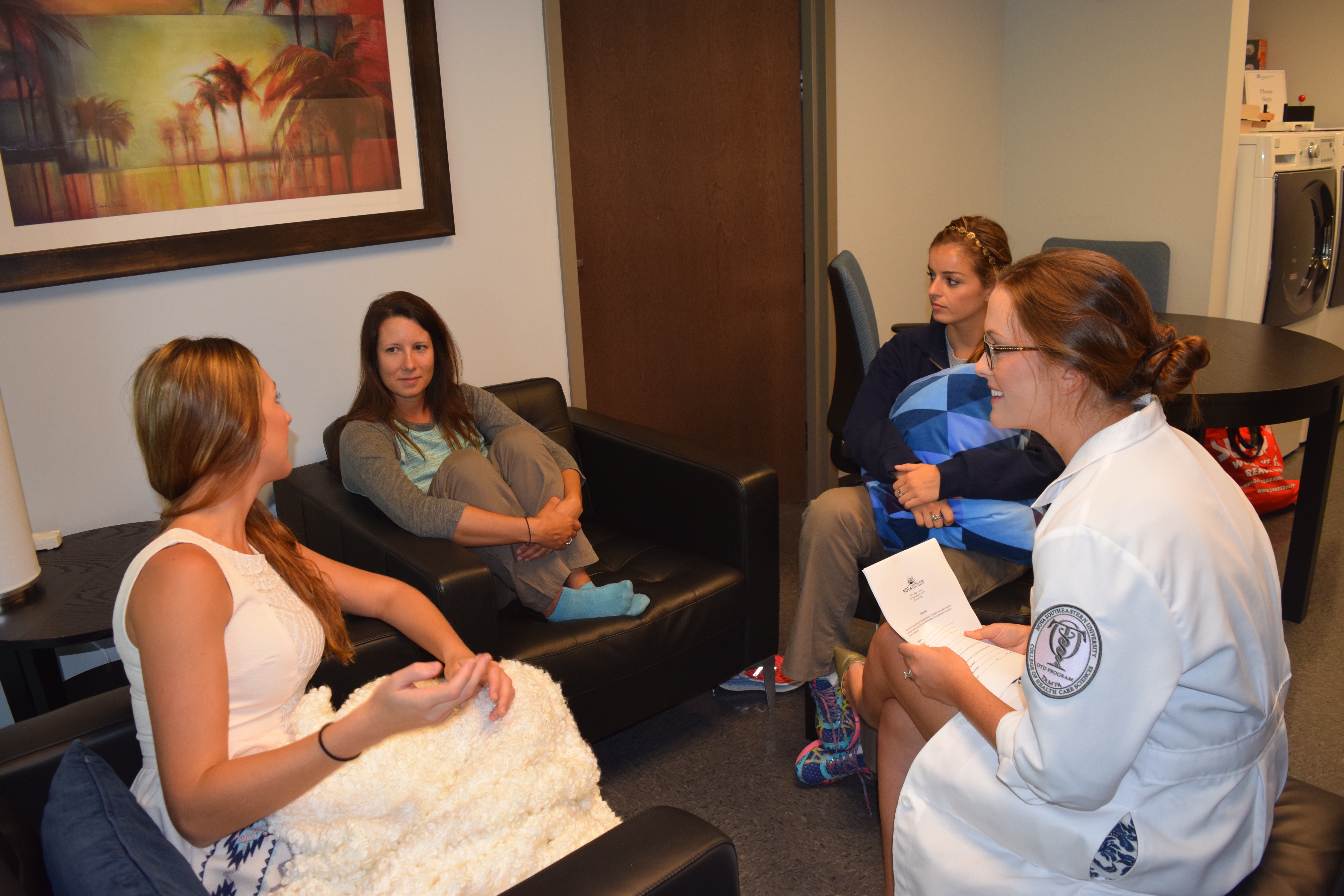
Sometimes, talking with others who are in a similar situation is the best way to get through the hard times. It gives you an opportunity to share your thoughts and experiences with others who can understand what you are going through, as well as get advice and support from your peers.
People with COPD often feel misunderstood and isolated because of their disease, but being part of a support group will help you realize that you are definitely not alone. There are at least twelve million other people in America who are fighting the same fight against COPD, and there are many therapy groups all across the country made specifically for people who suffer from COPD and other respiratory diseases.
If you would like to join a COPD support group, talk to your doctor about programs and resources in your city. If there are no adequate options in your area or if you would prefer to participate online, there are also many online COPD support groups to choose from that aren't limited by geographical location.
One of the great benefits of online COPD support groups is that you can participate without ever having to leave your home. This makes online therapy a great option for people with busy schedules or who have severely limited mobility.
Here are some support groups to consider:
- The American Lung Association's Better Breathers Club: This is a network of in-person support groups coordinated by the American Lung Association. Groups are run by trained facilitators and hold regular meetings where members get together to view presentations designed to give COPD patients information on managing their disease and living a better quality of life. Educational presentations include topics like exercise, breathing techniques, medications and treatment options, and home health care.
- The American Lung Association's COPD Support Community: This is a forum-style community established by the American Lung Association which provides “support through sharing personal stories, sharing helpful information on treatment and management, as well as learning from the experiences of others who are living with COPD.” They also have a general support group for people with lung diseases and a separate support group for people who want to quit smoking.
- COPD 360 Social: This is an online support community hosted by the COPD fondation. It's designed to provide a “comfortable venue to share thoughts and ideas, ask questions, start discussions, read and comment on blogs and communicate with peers, thought leaders, and community managers.”
- COPD-Support: This website has an email list, chatroom, and forum designed specifically to help people with COPD get information, advice, and support. They also have a few tailored support programs, including one for fitness, one for quitting smoking, and a support system for COPD patients who live alone without a caretaker.
- COPD International: This website has several options for COPD support. They have a general message board and chat room for patients, family members, friends, and caregivers, and a separate message board and chat room that is for patients only. Their general chat room is always open, but they also have scheduled COPD chats every day at 9pm and midnight.
- SupportGroups.com: This website has a support page specifically for people who have COPD. This group is unstructured and works more like a message board than a chat room. While most posts receive at least a few replies, there is not much recent activity on the page.
- Lung HelpLine: This is not a support group, but rather a telephone hotline established to provide advice and support to people with COPD. They also provide support and resources to anyone who is trying to quit smoking. To reach the LungHelpLine, call 1-800-LUNGUSA.
Mindfulness Meditation

Mindfulness meditation is an effective, evidence-based therapy that mental health professionals often recommend to patients who suffer from depression. It's not like the kind of meditation you see in movies and on TV; a mindfulness meditation session looks more like a time of quiet reflection and relaxation.
The purpose of mindfulness is to help you break free from the prison of your thoughts and focus on the present. It helps you shed off your worries, fears, and negative thoughts in favor of calmness, acceptance, and living in the moment.
Essentially, mindfulness meditation is about training your brain to brush off unhelpful and negative thoughts and judgments without struggling or fighting against them. Instead, you acknowledge your thoughts as they come and gently let them go, focusing on physical sensations like your breathing to help keep your mind in the present.

When you start practicing mindfulness meditation, it helps to have direction from a written or audio guide. It can help you stay focused on your meditation and give you the encouragement and confidence you need to stay motivated.
Practicing mindfulness can be frustrating at first, as most people find it difficult to clear their minds and not dwell on their inner thoughts. However, meditation is a process, not a goal, and you will find it easier and easier to do effectively if you stick with it and practice often.
Mindfulness meditation can be particularly helpful for people with COPD who tend to let worries about their disease make them anxious and depressed. Mindfulness can help you let go of stress and fear related to COPD and live life to the fullest in the present moment, instead.
Pulmonary Rehabilitation
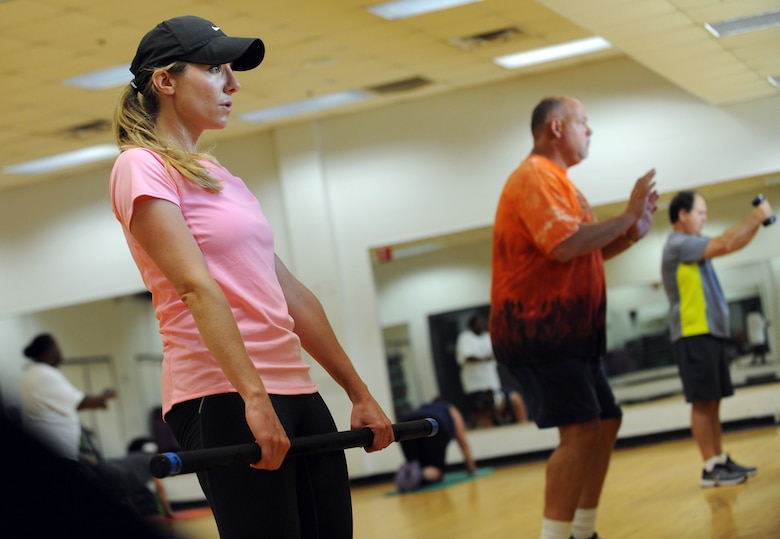 |
| Photo by Tommie Horton |
Pulmonary rehabilitation, a special class designed for people with chronic respiratory diseases, is a great way to get a better grip on both the physical and mental aspects of coping with COPD. It is often recommended for patients who have trouble managing the physical and emotional symptoms of the disease and studies show it can improve both anxiety and depression.
Pulmonary rehabilitation classes cover a variety of topics related to living with COPD, including diet, medication, exercise, and overall health. They usually include a mental health component like group therapy and give you access to mental health professionals that can help you learn to better cope with your disease.
Taking a pulmonary rehabilitation class can help improve your depression in a couple different ways. First, it gives you the opportunity to learn and practice healthy habits and gain more knowledge about how to manage your COPD. This will can help assuage your fears about the disease and help you feel more confident in your ability to manage it. That alone can improve your overall outlook and make you feel less depressed.
Second, having access to mental health professionals and group therapy can help you confront and cope with your negative emotions in a more direct way. Sharing your struggles and worries with other patients who are going through similar hardships can be very therapeutic and gives you the opportunity to learn from other patients' experiences and success.
In this way, pulmonary rehabilitation can help you gain back a sense of control over your life and change how you think about your disease. Instead of feeling despair about the things you can't control, you can feel optimistic about having a variety of tools and resources at your disposal to improve your symptoms and your quality of life.
Taking a pulmonary rehabilitation class will also help you learn to exercise, better manage your disease, and improve your overall physical state, which can do wonders for your mental health. Living a healthy lifestyle and getting enough physical activity makes it much easier to overcome depression and have a positive outlook on life.
Pet Therapy
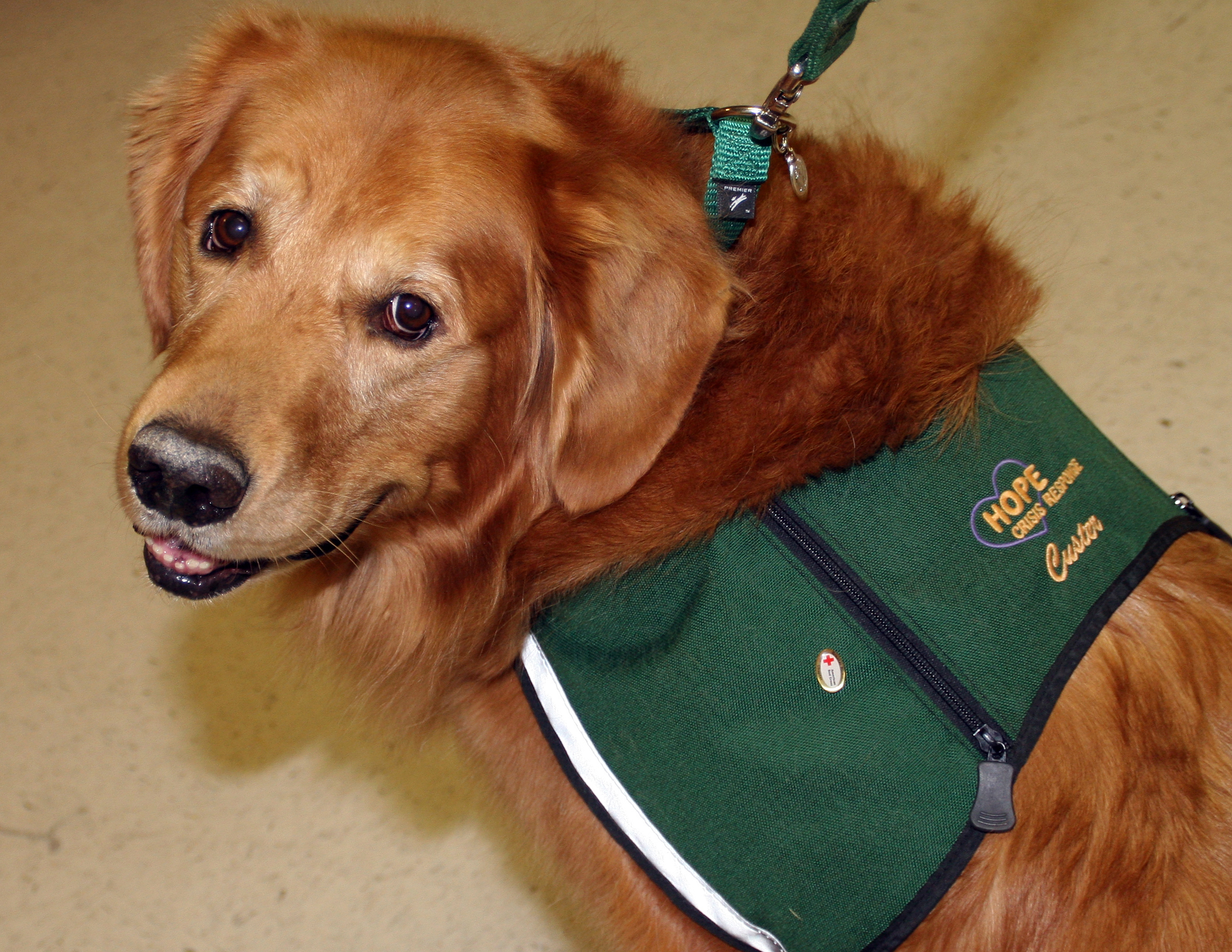
There is something about interacting with and caring for furry creatures that can reach even the deepest of emotional wounds. That's why there are many services that offer animal therapy, a type of therapy in which caregivers provide opportunities for patients to interact with dogs or cats to help them cope with mental and physical health problems.
It is often difficult for people with COPD to own their pets because of the amount of energy they require to care for and clean up after. That's what makes pet therapy such a great option for animal-lovers who are unable to own their own pets because of their living situation or physical condition
Pet therapy offers many potential physical and mental benefits, including improvements in mood, anxiety, and depression. It has also been shown to help with substance abuse, coping with feelings of loneliness and isolation, and even to improve cardiovascular health.
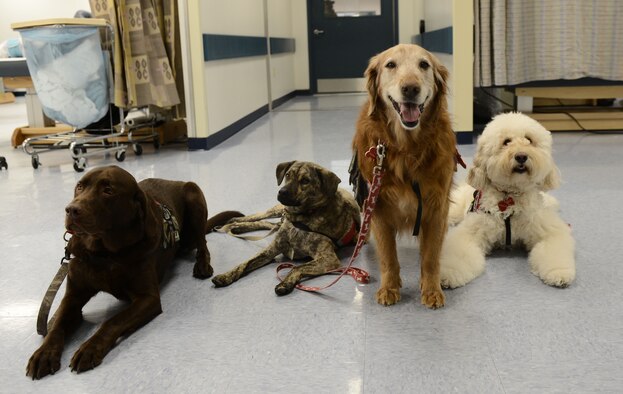 |
| Photo by Airman Joshua D. King |
To learn more about pet therapy resources in your area, you can talk to your doctor or local mental health services. You can also visit the American Kennel Club's website for a list of pet therapy programs around the country.
Find Your Way Out of Depression

No matter how grim things seem, it's important to remember that there is always a way out of the darkness. With the right support, coping mechanisms, and healthy daily habits, you can break free from depression and go back to truly living life again.
Taking advantage of the techniques and resources we've provided in this article is a great place to start, and can help you get yourself back on the road to recovery. However, there is no substitute for getting treatment from a licensed mental health professional, and you should always talk to your doctor or a psychiatrist if you notice the signs and symptoms of depression.
The good news is that depression is very treatable, and getting help for your depression will also help you better manage your COPD. Living with a chronic disease doesn't have to be miserable, and with the right help and habits you can experience the full joy and color of life again soon.


.png)





